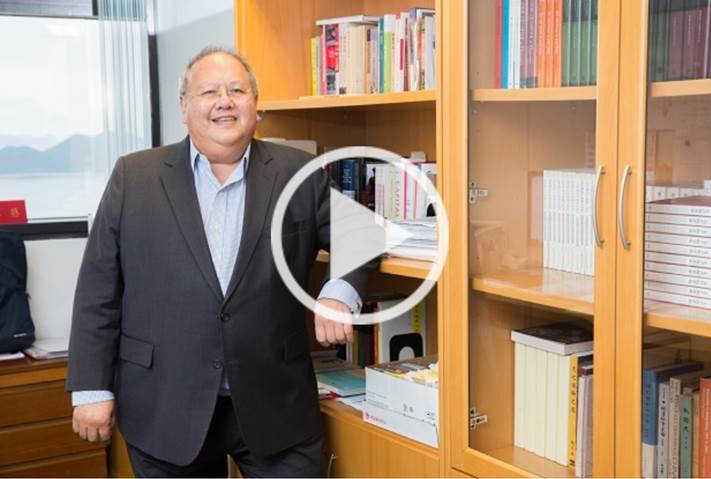
PROGRAM INTRODUCTION
Hear from our Academic Director - Professor James Lee, Yan Ai Foundation Professor of Social Science
Selected course sessions are delivered in real time online mode to facilitate in-class discussions and presentations. You can also schedule meetings with your professors and teaching assistants to discuss the material being presented in class or other related interests you have.
Admitted students can choose to take one or two courses online in the summer before the start of Fall term. They can further take six - seven courses to meet graduation requirements afterwards. The arrangement enables students to experience and adapt to the new learning mode in advance, it also facilitates students to coordinate their course plans for each term. They can have more time to devote into individual course study. Students enrolled in the MSc in Global China Studies program (MGCS) must complete 24 credits of coursework (3 credits each).
Sample Courses:
- Science, Technology, and Society in China, Parts 1 and 2
- Understanding China, 1700-2000: A Data Analytic Approach Parts 1 and 2
- Business English for Non-Native Speaker / English for Doing Business in Asia
- China and the World
- Social Science Approaches to the Study of Chinese Society
- Intimacy of Creativity: Entering the Minds of Composers
- China’s Economic Transformation, Parts 1 and 2
- China and Africa
Science, Technology, and Society in China, Parts 1 and 2
This course explores in general terms how engineering as well as scientific knowledge and practice are influenced by dynamic interactions between science, technology, innovation, and society. The course will introduce the innovation systems approach, laying the groundwork for mastering the remaining two parts of the course by introducing broad concepts and ideas to provide students with a platform on which to think about the science/technology–society relationship and related policy issues with a focus on China. Part Two will examine the impact of the Industrial Revolution in the West on scientific and technological progress in China.
You can click here to find out more about the course.
Understanding China, 1700-2000: A Data Analytic Approach, Parts 1 and 2
This course demonstrates how a new scholarship of discovery is redefining what is singular about modern China and modern Chinese history, and offers perspectives derived from Chinese experience over the last three centuries. Part One focuses on the question ‘Who are we?’ as seen through the framework of comparative population behavior – mortality, marriage, and reproduction – and their interaction with economic conditions and human values. Part Two focuses on comparative inequality and opportunity and addresses two related questions ‘Who rises to the top?’ and ‘Who gets what?’
You can click here to find out more about the course.
Business English for Non-Native Speakers
English for Doing Business in Asia
This course aims to improve your Business English language skills by developing your vocabulary and reading skills and your understanding of tone, style and knowledge of communication methods. We’ll also cover how these language skills can enhance audience analysis, business case analysis and basic business communication strategies. Skills learned in this course will often be referred to and needed to complete the speaking, writing and cross-cultural communications courses of this Specialization.
You can click here to find out more about the course.
China and the World
This course offers a conceptual framework for understanding China that highlights the intersection of politics and economics. In part One, we will assess both positive and negative outcomes of the political economy, study decision-making details of political leaders and Chinese people’s strategies to influence their leaders’ decisions. In part Two, this course tracks the opening of China up from 1978 until it joins the WTO, looks at various aspects of China’s “going out strategy”, and focuses on how the world affected China’s internal development.
You can click here to find out more about the course.
Social Science Approaches to the Study of Chinese Society
This course describes differences in the goals, basic paradigms, and research methods of the major social science disciplines. Students are expected to identify the key parts of a research proposal, learn the major sources of data for use in social science research and the most common approaches for inferring a causal relationship from quantitative data.
You can click here to find out more about the course.
Intimacy of Creativity: Entering the Minds of Composers
This course aims to develop a new paradigm for appreciating music from the perspective of both the composer and performer by teach melody and harmony. It will challenge traditional notions of the role of a composer in music, and redefine existing notions and the use of melody, harmony in music.
China’s Economic Transformation, Parts 1 and 2
This course shows the Economic Reform and Growth in China and Human Dimensions of Economic Development in China. In Part One, we will describe the origin and consequences of China’s key economic reforms since 1978 and to what extent China has integrated itself into the global economy. In Part Two, we will focus on China’s population policies and China’s massive internal migration, and Analyze the supply, demand, and regulatory factors influencing employment outcomes of skilled and unskilled workers.
You can click here to find out more about the course.
China and Africa
This course examines many of the most debated topics in the discourse of China and Africa links, based on fieldwork and empirical studies. Part I analyzes China-Africa ties in the context of Africa’s colonial background and the current global neoliberal order. It focuses on Chinese investment in Africa, especially mining and agriculture. Part II describes key social issues related to the Chinese presence in Africa, such as ethnicity and enterprise localization. It also analyzes whether Chinese and Western practices in Africa differ.
You can click here to find out more about the course.
* The courses listed above are those that we have offered since the program began to admit students, because not all courses can be offered every academic year, depending on faculty availabilities and student enrollment, they are listed for your reference only.
* This video is acknowledged by CEI, HKUST

